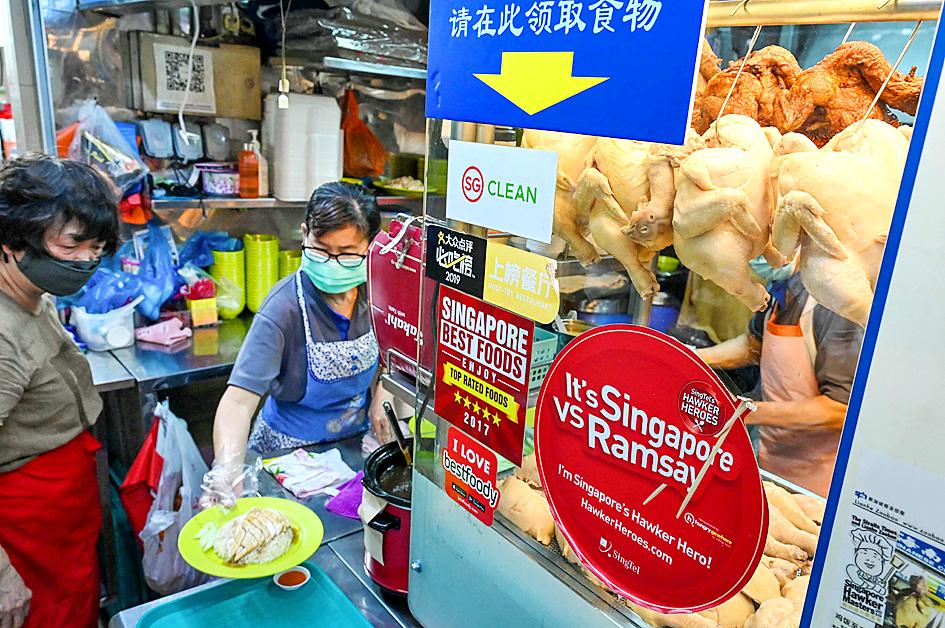Malaysia will stop exporting chickens from today in a protectionist move to bolster domestic food supply, sparking distress in neighboring Singapore where chicken rice is a national dish.
Malaysian Prime Minister Ismail Sabri Yaakob announced last week that, beginning today, Malaysia will ban exports of 3.6 million chickens a month until domestic prices and production stabilize.
The move is felt most in Singapore, which sources one-third of its poultry from Malaysia.

Photo: AFP
Almost all the chickens are imported live to Singapore, where they are slaughtered and chilled. Singaporean consumers have been rushing to stock up on fresh chicken ahead of the ban, with local media reporting that shelves in some wet markets and supermarkets have been cleared of poultry.
The Singapore Straits Times said chicken sellers predicted the cost of chilled chicken could rise by up to 30 percent, sending chicken dish prices soaring.
The Singaporean government has urged consumers to switch to frozen chicken and other alternative meats, and is exploring new markets for fresh chicken.
However, there is concern over the fate of the ubiquitous chicken rice that is sold everywhere from hawker stalls to top hotels. Popular eatery Tian Tian Hainanese Chicken Rice, which gets its poultry entirely from Malaysia, reportedly said it will introduce pork and seafood dishes instead of using frozen chicken if it fails to find new suppliers.
Malaysia’s protectionist move comes as countries worldwide grapple with soaring food prices, fueled partly by the Ukraine war. Ukraine is a major exporter of corn and grains that are key components of chicken feed. India has restricted sugar and wheat exports, while Indonesia temporarily halted — and then lifted — palm oil sales abroad.
Apart from the export ban, Malaysia also abolished import permits for chicken and other foods to boost food supply and curb prices amid public anger. It has earlier capped chicken prices and allocated subsidies for farmers squeezed by rising cost of chicken feed, partly caused by a weakening Malaysian currency.
The export ban came as a surprise by Ismail’s government, which took power in August last year and faces a general election next year. The government is also investigating claims that cartels are controlling the price and supply of chicken.
The ban not only caused alarm in Singapore, but also troubled smaller Malaysian poultry farmers who supply to Singapore to help keep their operations afloat.
The Malaysian government did not say how long the export ban will last, but officials expect supply and prices to normalize within a month.

With an approval rating of just two percent, Peruvian President Dina Boluarte might be the world’s most unpopular leader, according to pollsters. Protests greeted her rise to power 29 months ago, and have marked her entire term — joined by assorted scandals, investigations, controversies and a surge in gang violence. The 63-year-old is the target of a dozen probes, including for her alleged failure to declare gifts of luxury jewels and watches, a scandal inevitably dubbed “Rolexgate.” She is also under the microscope for a two-week undeclared absence for nose surgery — which she insists was medical, not cosmetic — and is

CAUTIOUS RECOVERY: While the manufacturing sector returned to growth amid the US-China trade truce, firms remain wary as uncertainty clouds the outlook, the CIER said The local manufacturing sector returned to expansion last month, as the official purchasing managers’ index (PMI) rose 2.1 points to 51.0, driven by a temporary easing in US-China trade tensions, the Chung-Hua Institution for Economic Research (CIER, 中華經濟研究院) said yesterday. The PMI gauges the health of the manufacturing industry, with readings above 50 indicating expansion and those below 50 signaling contraction. “Firms are not as pessimistic as they were in April, but they remain far from optimistic,” CIER president Lien Hsien-ming (連賢明) said at a news conference. The full impact of US tariff decisions is unlikely to become clear until later this month

GROWING CONCERN: Some senior Trump administration officials opposed the UAE expansion over fears that another TSMC project could jeopardize its US investment Taiwan Semiconductor Manufacturing Co (TSMC, 台積電) is evaluating building an advanced production facility in the United Arab Emirates (UAE) and has discussed the possibility with officials in US President Donald Trump’s administration, people familiar with the matter said, in a potentially major bet on the Middle East that would only come to fruition with Washington’s approval. The company has had multiple meetings in the past few months with US Special Envoy to the Middle East Steve Witkoff and officials from MGX, an influential investment vehicle overseen by the UAE president’s brother, the people said. The conversations are a continuation of talks that

CHIP DUTIES: TSMC said it voiced its concerns to Washington about tariffs, telling the US commerce department that it wants ‘fair treatment’ to protect its competitiveness Taiwan Semiconductor Manufacturing Co (TSMC, 台積電) yesterday reiterated robust business prospects for this year as strong artificial intelligence (AI) chip demand from Nvidia Corp and other customers would absorb the impacts of US tariffs. “The impact of tariffs would be indirect, as the custom tax is the importers’ responsibility, not the exporters,” TSMC chairman and chief executive officer C.C. Wei (魏哲家) said at the chipmaker’s annual shareholders’ meeting in Hsinchu City. TSMC’s business could be affected if people become reluctant to buy electronics due to inflated prices, Wei said. In addition, the chipmaker has voiced its concern to the US Department of Commerce